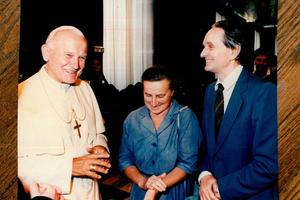Desire for Freedom Celebrated, Pondered at ‘New York Encounter’
Communion and Liberation’s annual event in the Big Apple showcases the experience of freedom in the arts, politics, business and faith.

NEW YORK — The soaring lyrics of the black spiritual greeted the crowd gathered to celebrate the “Experience of Freedom” at the 2013 New York Encounter: “But I know this: If Jesus leads me, I shall be free one day.”
The music provided a fitting prelude to the Jan. 18-20 New York Encounter, which offered multiple perspectives on freedom, from an eye-witness account of the life and death of Shahbaz Bhatti, the slain Pakistani religious-freedom activist, to a business leader’s adventure story of exploring for natural gas and a priest’s reflections on the spiritual struggles of families in Newtown, Conn., after the killing of 20 local children and six adults at an elementary school last month.
At first glance, some of the scheduled presentations seemed disconnected from the general theme of the weekend event, sponsored by Communion and Liberation, the international Catholic lay community based in Italy, and an affiliated U.S. group, Crossroads Cultural Center.
Over the past year, U.S. Catholics have focused on political challenges to the free exercise of religion posed by the federal contraception mandate. So why listen to Harold Korell, the former CEO of a top energy company, explain how his team found one of the nation’s biggest natural-gas fields?
“Experience of Freedom” explored how the exercise of human freedom shapes personal achievement, intimate relationships and the hunger for God. Indeed, the decision to broaden the discussion about human freedom to include topics like the one detailed by Korell highlights a singular contribution of Communion and Liberation’s cultural programs: They resist the modern tendency to isolate faith and the search for meaning from other aspects of human experience.
‘Cultural Virus’
Msgr. Lorenzo Albacete, the spiritual leader of Communion and Liberation in the United States, described the modern tendency to both privatize faith and to reduce human freedom to the pursuit of individualist goals as a “cultural virus.”
“The work of this virus is to reduce our freedom; therefore, to separate the life of faith from the life of freedom,” said Msgr. Albacete in the first presentation of the weekend that set the tone for subsequent testimonials and lectures.
Msgr. Albacete echoed Pope Benedict XVI’s insistence that the Catholic faith is not a “project” or a moral system, but a personal encounter with Jesus Christ. And if “faith is the experience of a Person,” he said, then “what this virus wants to do is separate this Person from our deepest self.”
The virus works to debase the truth and meaning of love, properly defined by Christ’s self-sacrificial act. When the meaning of love changes, the person’s understanding of human freedom is altered as well, leading one to choose a kind of “freedom” that flees personal sacrifice.
Yet, amid such confusion, tragedy may revive a stillborn faith or prompt the search for life’s true purpose. That was the theme of several personal testimonies at the New York Encounter, including a former alcoholic’s tale of spiritual and physical rebirth.
One presentation told the story of a young man in prison, who began corresponding with members of Communion and Liberation. Over time, he deepened his Catholic faith, admitting in one letter read aloud before the audience that his encounter with Christ had finally allowed him to experience true freedom while still behind bars.
Shahbaz Bhatti’s Sacrifice
Paul Bhatti, the brother of Shahbaz Bhatti, the Pakistani government minister and Catholic leader assassinated by Islamic extremists in March 2011 after he spoke out against the country’s anti-blasphemy laws, offered a different kind of testimony.
Bhatti reflected on how his brother’s uncompromising commitment to social equality inspired him to leave the safety of his home in Europe to return to Pakistan and carry on Shahbaz’s work.
“My brother started his struggle when he was just a student in school. With great conviction and strong faith in Jesus Christ … he was ready to face the threats and adversities” generated by his activism, said Paul Bhatti.
While his younger brother fought for the civil rights of Pakistan’s dispossessed religious minorities, Paul Bhatti practiced medicine in Italy. He urged his brother to leave Pakistan to save his life, but Shahbaz believed that Christ was guiding his work and refused to back down.
Now Paul Bhatti is back in Pakistan and has been appointed the Pakistani federal minister for minorities' affairs.
Dominican Father Peter Cameron, the editor in chief of Magnificat, witnessed the spiritual impact of tragedy firsthand while celebrating Mass at St. Rose of Lima parish in Newtown, Conn., where first-grade children and staff were shot dead at their school last month.
When Father Cameron arrived to celebrate Mass in the wake of the killings, the small church was overflowing with stunned Catholics, but also agnostics and non-believers.
“They were people in a desert of desolation, and they wanted to be led out of it. As I gazed at their faces, I could tell that they were looking for something,” Father Cameron said. “Thousands had come to St. Rose of Lima — and stayed even when they couldn’t get inside the church — because they needed to be given something so that they would have the strength to face another day.”
Hardwired for Truth?
Is human freedom, by its very nature, hardwired to search for truth, to see the face of God?
Father Cameron cited Pope Benedict’s 2011 apostolic letter for the current Year of Faith, Porta Fidei, which states: “We must not forget that … very many people, while not claiming to have the gift of faith, are nevertheless sincerely searching for the ultimate meaning and definitive truth of their lives and of the world.”
Human freedom makes that search possible. Desire, imagination, curiosity and suffering lead people to engage reality, test beliefs and make choices about what to do or who to love.
Harold Korell, the chairman of the board of Southwestern Energy, one of the top U.S. oil and gas exploration and production companies, described how a hardworking, “curious” team of engineers finally located a vast field of natural gas in Arkansas.
The experience, said Korell, taught him an important lesson about innovation: “When I was hiring people, if I didn’t see a spark of curiosity and adventure, I wouldn’t hire them.”
Korell did not mention his religious beliefs during his presentation. But the unstated message for the audience was that freedom should be celebrated and pondered as a manifestation of the human person’s thirst for truth and for God.
A Friendly Conversation
Maurizio Maniscalco, the president of the New York Encounter, told the Register that the three-day event, like many of the Crossroads Cultural Center's programs in New York, Washington, Los Angeles, Houston and Denver, was designed to be a “conversation among friends.”
The initial idea, he said, emerged from something he learned from Father Luigi Giussani, the Italian priest who founded Communion and Liberation in the mid-1940s.
“I had the great gift of having Giussani as one of my college teachers back in Milan in the '70s. I learned from him not to be afraid of any human desire. And I learned that the person you bumped into a few minutes earlier can be as helpful as the one who has been around forever,” said Maniscalco.
“‘A conversation among friends’ means getting together with the desire of sharing and with the awareness that we are all human beings,” he continued. “Each of us has been given gifts. But he or she may not be aware of it and only discover those gifts in a conversation among friends.”
Joan Frawley Desmond is the Register’s senior editor.
- Keywords:
- catholic faith
- church movements
- communion and liberation
- msgr. lorenzo albacete
- new evangelization
- shahbaz bhatti

















